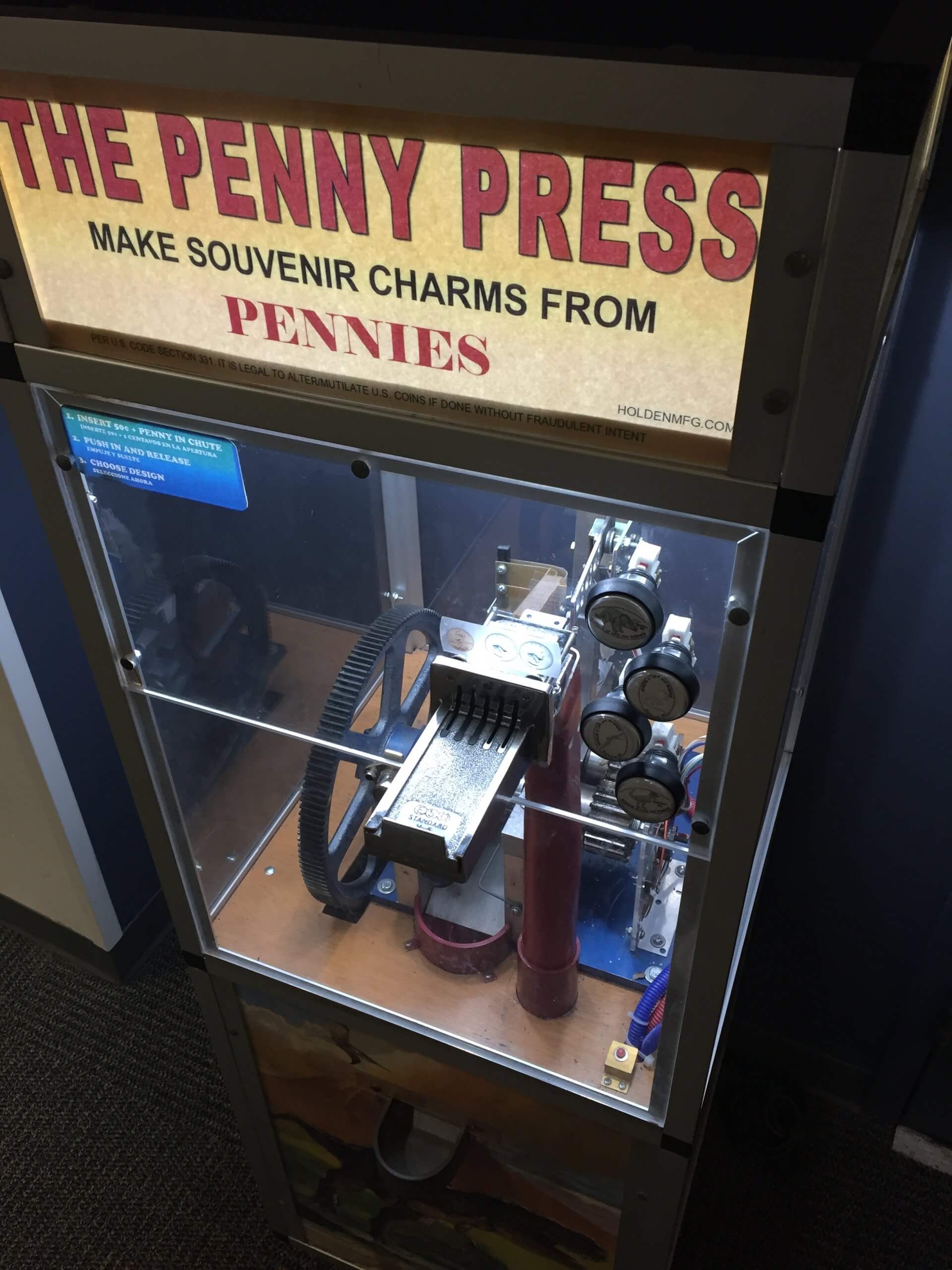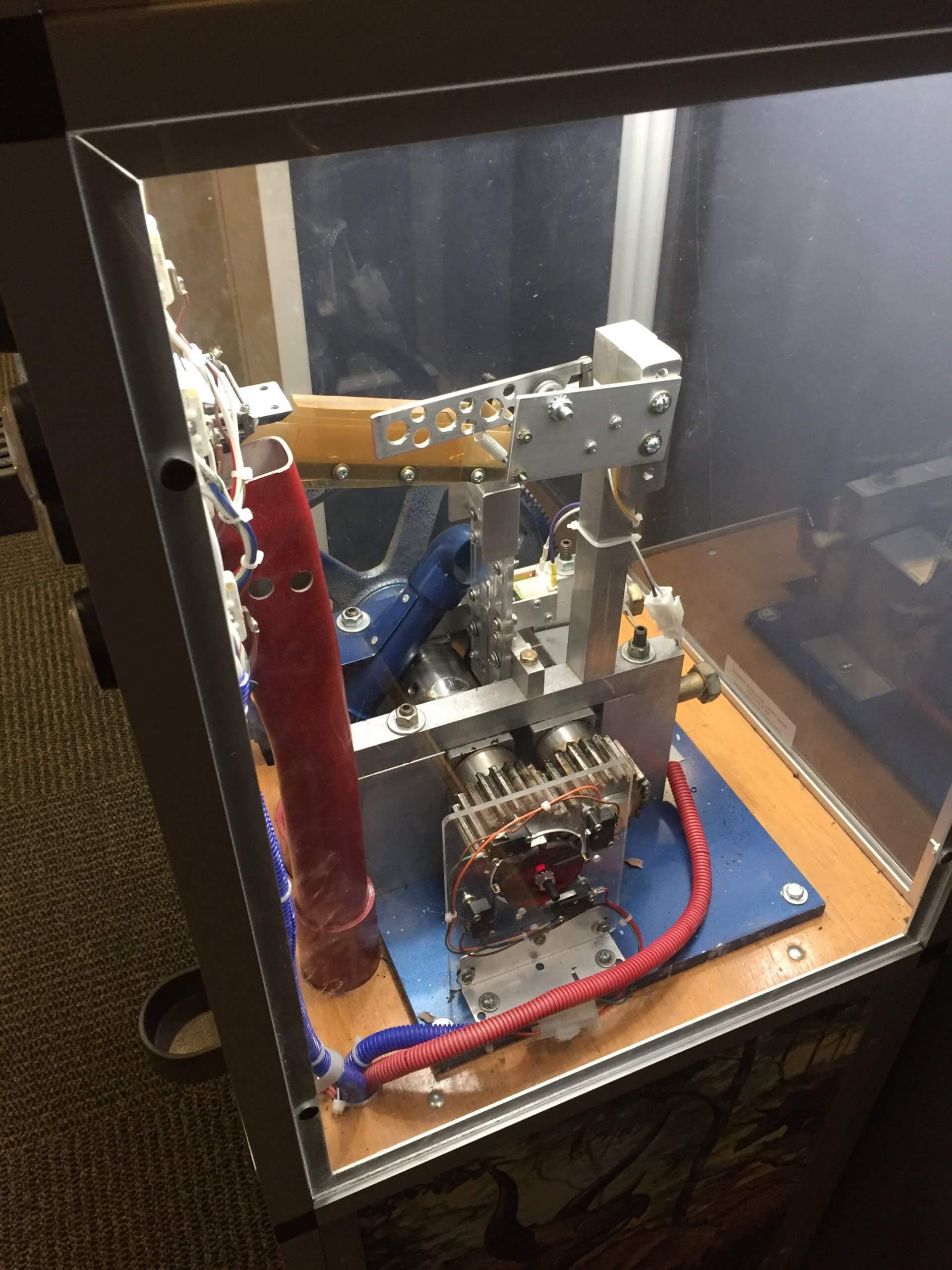Entrepreneurial support organizations are integral to ecosystems across the country. Forward Cities Research developed a new tool that assists them in identifying opportunities for more effective collaboration among each other in an effort to deepen their impact on all entrepreneurs in the community.
Exonumia [ ek-suh-noo-mee-uh, -nyoo- ] plural noun
items, as tokens or medals, that resemble money but are not intended to circulate as money.
You have seen this machine before, even if its many names don’t come so easily to mind. Some are hand-cranked; the more modern ones are fully automatic, exerting more than 10,000 pounds on a few inches of metal. Mostly these wonder boxes can be found in museums or airports, embossing a range of different prints on the penny you feed into them. At airports in particular, they have a hard time competing these days against phones, coffee chains, and any other exciting new attention-grabbers that distract us from plopping a coin into them to bring their magical inner workings to life.
easily to mind. Some are hand-cranked; the more modern ones are fully automatic, exerting more than 10,000 pounds on a few inches of metal. Mostly these wonder boxes can be found in museums or airports, embossing a range of different prints on the penny you feed into them. At airports in particular, they have a hard time competing these days against phones, coffee chains, and any other exciting new attention-grabbers that distract us from plopping a coin into them to bring their magical inner workings to life.
They go by the names “penny pressers, penny crushers, or squishers,” according to some. A quick search yielded many more namesakes including “penny crusher” and “penny pincher,” which clearly someone must have coined for whom even ‘the cheapest souvenir’ was too expensive.
“So, what?” you may think. What does the penny presser have to do with entrepreneurs and more specifically the entrepreneurial ecosystems [1] that we at Forward Cities work to catalyze in communities across the U.S.?
Last year, the late Dr. Amy Gannon’s aptly titled and deeply insightful post “We Need Meaningful Metrics to Evaluate Entrepreneurial Ecosystems” reminded the field of ecosystem builders and entrepreneurial allies to rally behind measures, key concepts, and vocabulary that capture what we believe makes ecosystems tick. Not only are these essential to describing the building blocks of ecosystems, they are also the foundation for generally agreed-upon evaluations. In the words of the Kauffman Foundation, this work is part of the effort to cross the chasm that persists today in the field of ecosystem building, “the leap all new ideas must make to reach mainstream adoption and broad impact.”

Recognized standards of measurement and robust and replicable ways (for folks doing the ecosystem building work) to apply them are some of the immediate hurdles on the path to sustainability. I believe the window of opportunity for establishing and translating these into user-friendly tools is slowly beginning to close. Sometimes urgency has a unique ability to sharpen our minds and unlock our creativity, though.
As we try to better understand entrepreneurial ecosystems, let’s take stock of things we can more easily observe or survey [2], for instance, formalized Entrepreneurial Support Organizations (ESOs) and the interactions they report having with one another. By looking at these more carefully, we believe we can demystify some of the more vexing measurement challenges such as determining the balance of bonding and bridging capital in an ecosystem or the thickness of its institutions, all of which are shown to relate to how well ecosystems empower all entrepreneurs.
At Forward Cities Research, we developed a “Self-assessment of the Entrepreneurial Support Ecosystem.” It is an inventory of strengths and opportunities for formalized support providers, which we piloted for first time in seven North Carolina communities and have since rolled out to St. Louis, Indianapolis, Pittsburgh, Franklin County/Columbus, Long Beach, Baltimore and the Rio Grande area and are planning to expand to many more communities in our national E3 Learning Network over the next year.
This self-assessment is the penny press in the works; it lays bare the  mechanics of the local entrepreneurial ecosystem. And what it produces is an exonumia, a point-in-time stamp, an imprint of the main characteristics that make up the surveyed parts of the ecosystem. The self-assessment needs to be completed by as many of a community’s formalized entrepreneurial support providers as possible in order to provide a representative snapshot of how well the ecosystem performs. The 20-minute self-guided survey produces ecosystem ‘scores,’ exonumismatic snapshots in time, for three core dimensions of ecosystem health:
mechanics of the local entrepreneurial ecosystem. And what it produces is an exonumia, a point-in-time stamp, an imprint of the main characteristics that make up the surveyed parts of the ecosystem. The self-assessment needs to be completed by as many of a community’s formalized entrepreneurial support providers as possible in order to provide a representative snapshot of how well the ecosystem performs. The 20-minute self-guided survey produces ecosystem ‘scores,’ exonumismatic snapshots in time, for three core dimensions of ecosystem health:
- Awareness of available resources and entrepreneurial roadblocks
- Alignment around shared goals and strategies to achieve these goals
- Action that furthers the mission of multiple support organizations and includes entrepreneurs in its design


The self-assessment then renders the results in an intuitive, graphical way back to the respondents. We experimented with different visualizations and ultimately settled for a spider web graph because it effectively communicates in one graph each the ecosystem’s own performance on the three dimensions (left graphic above) and its performance relative to peer communities (right graphic above). For each dimension the graphs indicate a score, on a scale from 0-100%, that describes, for instance, how developed strategic alignment is in the given ecosystem. In this example, an alignment score of 67% indicated that across all respondents from this community the ecosystem is seen as being two-thirds along the way to being perfectly aligned.
Over the next months, our team will make the entire self-assessment publicly accessible for anyone to use. Participants of our E3 Learning Network will receive concierge support for mobilizing respondents from their ecosystem and interpreting the results.
And a promise up-front: if at some point we should surpass 100 ecosystem self-assessments from different communities across the country, we will find a funder that helps us purchase a penny press machine with custom engravings to share with you your ecosystem’s exonumia on a coin.
Make sure to leave your contact details in this short form to receive an update in your inbox when we upload the tool in the next weeks.
[1] The Kauffman Foundation defines an entrepreneurial ecosystem as “a network of people supporting entrepreneurs, and the culture of trust and collaboration that allows them to interact successfully. The ecosystem allows for the fast flow of talent, information, and resources so that entrepreneurs can quickly find what they need at each stage of growth.”
[2] I recognize that pursuing “known unknowns” in the research agenda may introduce its own biases, which we have to work hard to counterbalance as our understanding matures.